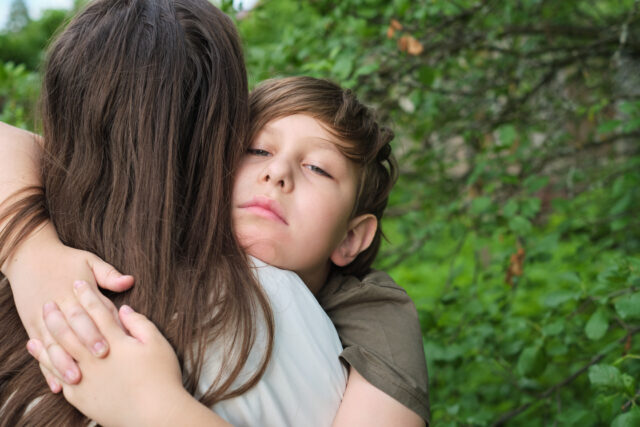Not every lesson passed down in a family is a good one.

Some behaviours and beliefs come from generations before, and they end up shaping how parents raise their children without them even realising it. When toxic family cycles go unchallenged, they get handed down like an inheritance, teaching kids things that can follow them into adulthood in ways that aren’t always obvious, but can be extremely harmful. Many parents mean well but end up passing along the very patterns they once struggled with. These are just some of the lessons pick up on due to unhealthy family cycles.
1. Love has to be earned, not given freely.

In toxic family dynamics, love often feels conditional. Parents may show affection only when their child achieves something, behaves a certain way, or meets expectations. This teaches kids that love isn’t unconditionally given; it’s something they have to work for. As they grow up, they might struggle with relationships, constantly feeling like they have to prove their worth to be loved. Instead of believing they are enough as they are, they may feel pressure to achieve or please other people just to be valued.
2. Talking about feelings isn’t safe.

Many children in toxic households learn that expressing emotions leads to trouble. They might get told to “stop crying,” be mocked for their feelings, or see their parents shut down emotional conversations entirely. Over time, they internalise the message that emotions should be hidden. It can lead to struggles with emotional regulation and communication in adulthood. Instead of expressing how they feel, they may bottle things up, terrified of judgement or rejection whenever they try to open up.
3. Conflict means someone has to win and someone has to lose.

In some families, disagreements turn into full-blown battles, with no room for compromise. Parents may model unhealthy conflict resolution by yelling, blaming, or refusing to listen. As a result, kids grow up thinking that arguing is about winning rather than understanding. Later in life, they might struggle with handling disagreements in a healthy way. Instead of seeing conflict as a chance to communicate and solve problems, they may avoid it entirely or approach it aggressively, repeating the patterns they grew up with.
4. Apologies are a sign of weakness.

In families where parents never admit when they’re wrong, children learn that apologising is a weakness rather than a strength. If a parent refuses to take responsibility for their mistakes, kids grow up thinking that accountability is something to be avoided. It can make it hard for them to apologise as adults, even when they know they should. They may also struggle to accept apologies from other people, feeling like words don’t mean much when they were never backed up by change in their childhood.
5. Other people’s needs always come first.

Some children grow up being taught that their needs are less important than everyone else’s. If a parent constantly prioritises their own struggles or demands that their child be the “peacekeeper” in the family, that child learns to shrink themselves for other people. As adults, they may become chronic people-pleasers, struggling to set boundaries and prioritise themselves. They might feel guilty for saying no or asking for help, believing that their role is to always take care of everyone else first.
6. Success matters more than happiness.

In homes where perfectionism or achievement is highly valued, children often learn that their worth is tied to how well they perform. Parents might focus only on grades, awards, or future career success, unintentionally sending the message that happiness is secondary. As adults, these kids may struggle with feeling like they’re never doing enough. Even when they accomplish big things, they might not feel truly happy, because they were taught to chase success rather than joy.
7. Asking for help is something to be ashamed of.

If parents teach their kids to “toughen up” or handle things on their own, they may grow up believing that asking for help is a sign of failure. That can inevitably lead to having trouble asking for help, even when they genuinely need it. Whether it’s emotional, financial, or professional help, they may push through struggles alone rather than reaching out. In the long run, it can lead to burnout, isolation, and unnecessary stress that could have been avoided with support.
8. Love and affection can be taken away as punishment.

In some households, affection is given and withdrawn based on behaviour. A child who does something “wrong” may experience silent treatment, coldness, or emotional distance from a parent as a form of discipline. As adults, they might struggle in relationships, fearing that love is fragile and can disappear when they make a mistake. They may become overly cautious about upsetting people, worried that one wrong move could push someone away.
9. Being vulnerable makes you an easy target.

Children who grow up in critical or emotionally unsafe environments learn to protect themselves by staying guarded. If they were teased, dismissed, or punished for showing vulnerability, they may believe that keeping emotions hidden is the safest option. It can make emotional intimacy really tough in adulthood. They might struggle to open up, even with people they trust because, deep down, they fear being hurt or judged for revealing their true feelings.
10. You have to earn rest.

In households where productivity is praised above all else, children often learn that resting is lazy. If a parent constantly pushes them to “stay busy” or criticises them for relaxing, they may grow up feeling guilty about downtime. As adults, this can lead to burnout and an inability to slow down. Even when they desperately need a break, they may feel like they haven’t “earned” it, constantly chasing productivity instead of balance.
11. Anger is something to fear.

In homes where anger is expressed in explosive or unpredictable ways, children learn to associate it with danger. If a parent yells, slams doors, or reacts aggressively, kids may grow up feeling afraid of anger in any form. As adults, they may avoid confrontation at all costs or struggle to express their own frustration in a healthy way. Instead of addressing problems, they might suppress emotions until they reach a breaking point.
12. Criticism is more common than praise.

Some parents are quick to point out mistakes but slow to offer encouragement. If a child grows up constantly hearing what they did wrong but rarely hearing what they did right, they internalise the belief that nothing they do is ever good enough. When they grow up, they may struggle with self-doubt, perfectionism, or a constant need for external validation. Even when they succeed, they might find it hard to actually feel proud of themselves.
13. Keeping secrets keeps the family together.
 Source: Unsplash
Source: Unsplash In toxic family systems, children are often taught, whether directly or indirectly, that keeping quiet about problems is more important than addressing them. Whether it’s family issues, trauma, or unhealthy behaviours, they learn that talking about these things is “betraying” the family. As adults, this can make it hard to speak up about boundaries, personal struggles, or toxic relationships. They might feel guilt or fear when trying to break the cycle and choose honesty over secrecy.
14. Appearances matter more than reality.
 Source: Pexels
Source: Pexels Some families prioritise keeping up a “perfect” image rather than addressing real problems. If a child is told to smile for photos while chaos happens behind closed doors, they learn that looking good to outsiders is more important than actually being okay. Later in life, this can lead to struggles with authenticity. They may feel pressure to pretend everything is fine even when it isn’t, scared of being judged if they admit that things aren’t perfect.
15. Change isn’t possible, so don’t bother trying.

If a child grows up in a home where negativity, complaining, or hopelessness is common, they might develop the belief that nothing ever really changes. If their parents constantly blamed other people or saw problems as unfixable, they may adopt the same mindset. As adults, this can lead to feeling stuck, unmotivated, or fearful of taking risks. Breaking free from this belief means realising that change is possible, but it starts with unlearning what was taught.




